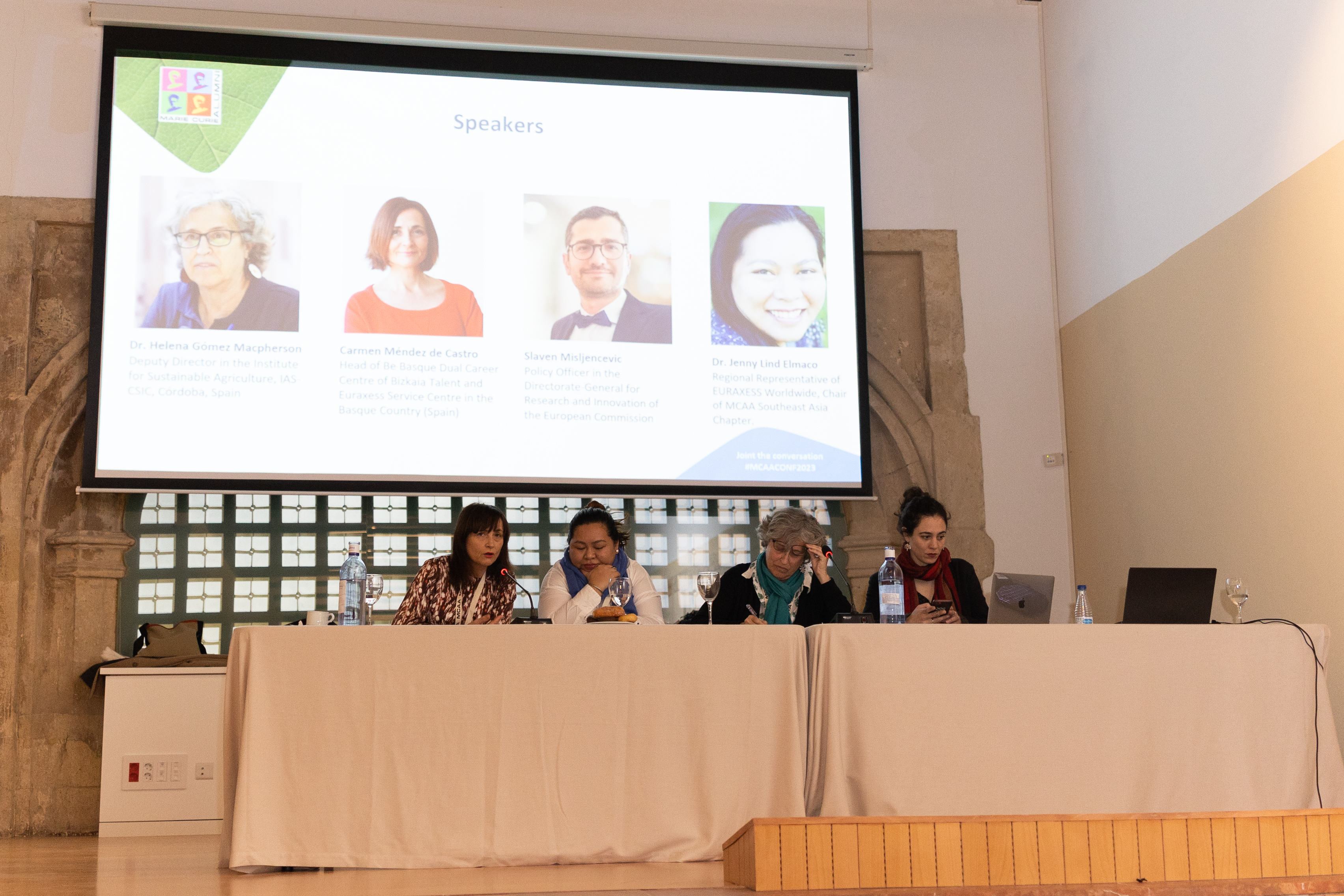MCAA Annual Conference 2023 - Brain Drain or Gain: Inventory of Challenges and Solutions
Newsletter
The expert panel comprised of Helena Gómez Macpherson, Jenny Lind Elmaco, Carmen Mendez De Castro and Slaven Misljncevic discuss the factors governing brain circulation, the challenges faced by researchers due to barriers in mobility and the systemic changes required to achieve equitable and sustainable brain circulation, within EU and around the world.
"Don’t ask me where I am from, ask me where I am local”
Jenny Lind Elmaco used this famous quote by writer Taiye Selasi to highlight the perspective of the global scientific diaspora. A research career involves constant learning. Mobility is a crucial instrument enabling career growth for early stage as well as senior researchers. However, this mobility can often be the cause of an imbalanced distribution of talent and can steadily erode the scientific talent in certain regions.
Helena Gómez Macpherson, moderator of the panel discussion, opened the session by reframing the concept of brain drain as brain circulation, making a clear distinction between the benefits arising out of mobility for researchers, science and society and the challenges it poses at each of these levels when imbalanced.
For mobility to be successful, there needs to be effective communication between the incoming researcher and their host institution. Carmen Mendez De Castro emphasized that researchers do not exist in a void. An incoming researcher requires the right support system for both their personal and professional life. Researchers in turn need to be fully aware of allied issues such as financial remuneration, tax and pension laws, social support structures etc, before they can make an informed choice about moving. Initiating and mediating these conversations at an early stage can save precious time, energy and money for both the researcher and the host institution. This applies equally to those researchers considering moving back to their home country. The panel highlighted both ongoing as well as new features in Euraxess to provide reliable and user-friendly resources to facilitate mobility of researchers.
Mobility can sometimes create barriers to researchers and their career progress. The panel highlighted their own personal experiences with national barriers to mobility. Some states/institutions operate from a fear of brain drain, often imposing state service requirements for researchers leaving the country on state-sponsored mobility which acts as a deterrent. Additionally, researchers may also have difficulty getting recognition for degrees obtained in other countries. This lack of harmonization leaves the researcher locked out of opportunities and may require legal recourse. Another determinant in whether a researcher returns to their home country is the availability of opportunities and jobs that match their skill set and expertise. Society as a whole needs to be brought on board with the advantages of brain circulation. This includes everyone from politicians to businesses to lawmakers. Co-operation from all these stakeholders is necessary to increase the attractiveness of countries to global talent pools.
Slaven Misljncevic provided a system-level view of this issue from the perspective of the European Commission. Action 4 of ERA policy agenda, which focuses on promoting attractiveness of research careers and providing balanced talent circulation, has the support of 25 out of 27 member states. For effective action, we first require effective understanding of the triggers behind imbalanced brain circulation, which the EC classifies under 4 broad categories
• Recruitment, working conditions and career progression opportunities
• System level factors such as stability of RnD funding, long term RnD strategy, lack of coordination at institutional, national and cross-border decision-makers.
• Research environment including research infrastructure, training etc.
• Research excellence factors that foster recognition
Socio-economic factors can be especially resistant to change and require significant political will and financial investment to overcome. The horizon Europe budget has increased support to MSCA actions with incentives to boost inter-sector cooperation and balanced brain circulation. Existing instruments like MSCA and Euraxess are being supplemented with new initiatives such as the RESAVER pension fund, which creates a European pension fund to foster mobility of researchers. An observatory of research careers is being developed along with OECD to gain a comprehensive understanding of the issues affecting brain circulation. ERA hubs, makes EU funding available to member states for the development of local ecosystems that are interconnected and harmonious across borders, to help reduce disparities across countries.
At the end of the day, brain circulation is a complex issue that spans all the levels from an individual and goes up to national and international levels. Each of these levels are interconnected and therefore require a concerted and comprehensive approach. It starts with the recognition of the positive impact that cross-border dialogue, exchange of views and expertise can have not only on science but society as a whole. There is a significant will to find a solution, however, we need to sustain this momentum to truly make a difference.
Namrata Iyer
MCAA Newsletter, Editorial Board
